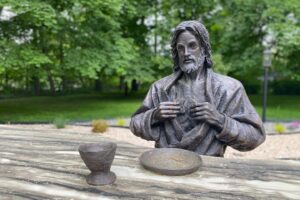 I think American views of Christianity are at a fork in the road. Some are lamenting while others rejoice that the criticisms of religion are finally mainstream. Religion has been displaced from the public sphere for nearly a generation now and will not likely return. This, however, has led to something that is being called “post-secularism,” which by definition is seeking to move beyond the anti-religion of yesteryear and try to synthesize “secular” life with spiritual life. Note, this is a synthesis not a replacement of one over the other. By separating Christian theology from other disciplines and spheres of life, we have actually hurt the faith.
I think American views of Christianity are at a fork in the road. Some are lamenting while others rejoice that the criticisms of religion are finally mainstream. Religion has been displaced from the public sphere for nearly a generation now and will not likely return. This, however, has led to something that is being called “post-secularism,” which by definition is seeking to move beyond the anti-religion of yesteryear and try to synthesize “secular” life with spiritual life. Note, this is a synthesis not a replacement of one over the other. By separating Christian theology from other disciplines and spheres of life, we have actually hurt the faith.
I believe we are coming around to realizing that there needs to be a healthy synthesis of the two (in part, because the sacred and profane dichotomy may be a false one).
That being said, should American Christianity be redefined?
I want to argue, yes and no.
The way the faith has been represented, shown, and taught over the past few decades has not resonated well with people. Many have a stale taste in their mouth, and rightly so. Christianity needs to be redefined. Or rather, it needs to return to what it once was.
I do not believe what we need now is to reinvent the wheel, but just to remember how the wheel is supposed to be used.
Any form of the Christian faith that is not seeking transformation of the individual is a far cry from Christianity. If the expression of faith you see around you is not seeking personal transformation, then on some level, it is really about the ego inflation of some select group in the community. If it is based on shame, guilt, or fear then it likely is being used as a weapon. However, a Christian faith that is based on edification, restoration, forgiveness and love may just be the perfect embodiment of the Beatitudes.
For the past few months I have been reading Bonaventure. He was one of the early masters of the Franciscan order and wrote what we consider to be the best biography of Francis of Assisi. He was a professor of theology in Paris and wrote extensively on Christian mysticism.
What fascinates me about Bonaventure is that he was a highly Trinitarian theologian who ALSO places a high amount of emphasis on personal experience of the faith. We tend to choose one or the other, and even then, we do that one thing poorly. Perhaps, because you have to do each well in order to do both well. (A rich faith leads to rich experience and rich experience leads to rich faith.)
Again, I do not believe what we need now is to reinvent the wheel, but just to remember how the wheel is supposed to be used.
The faith has been used as a weapon. The faith has been used as a means to separate. The faith has been used as a form of moral elitism. No wonder it does not look attractive. Not even to me.
I am convinced, however, that a healthy spirituality is interested in these four things…
Good – as it pertains to ethics.
Truth – as it pertains to philosophy.
Beauty – as it pertains to experience.
Love – as it pertains to reflecting the character of God.
I want to reclaim the word “mysticism.” I want to reclaim that, at its root, it truly is concerned with mystery. Yes, it is a mystery that has been revealed in the life of a first century Jewish carpenter/travelling rabbi, but it is a mystery that we are given the grace to apprehend. I think our “new” mysticism needs to look like the same old mysticism of Bonaventure. I believe that Thomas Merton was correct when he said, “The only cure for the angst of modern man is mysticism.”
We have over-emphasized theology at the expense of transformative experience. The solution, though, is not to swing the other way, from side to side. Even children on the playground know swings are not meant to be used in such fashion. The thrill of a swing set is found in moving forward and up. Swinging side to side, between theology and transformative experience is clumsy. Why not let our theology and our experience move us forward and up? How is it possible, that over who knows how man generations, that we have forgotten how to do it? Isn’t the goal to move onward and upward, with ever more thrilling excitement? Using rich theology as an anchor just as much as rich experience? The swing may be a playful analogy but it does carry some amount of truth.
With theology and experience as equals, our “swings” can help us to cultivate personal and communal lives that are thriving. That sounds more enjoyable. I’ll take the swing, you let me know when you are ready to try it as well.


